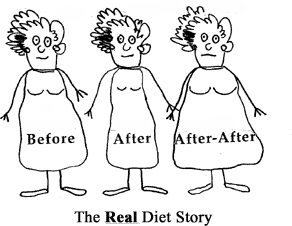Why You Should Never Go On A Diet
This year you’ve probably been bombarded with fitness challenges that will Transform Your Body in 21 Days. Weight loss programs that promise to help you lose 20 to 30 pounds in only six weeks are all over the internet, social media, and TV. Just yesterday I saw a TV commercial for “fast medical weight loss” with an obese doctor in a lab coat in the ad. (I can assure you that adding a doctor in a lab coat doesn’t validate your weight loss program.)
The truth is most of those programs actually work—short term. You can see the results they typically post of participants who’ve lost 20 to 30 pounds in six weeks—or sometimes even less. Just about anyone can go on a diet and lose weight, but the chances of keeping that weight off long term are very slim (pun intended).

The reality is most people who lose 20 to 30 pounds on a diet end up regaining 30 to 40 pounds in the next six months. Two thirds of dieters who restrict calories regain more weight than they lost on their diets.
To make matters worse, losing weight quickly will typically cause you to lose a good deal of muscle, which will lower your metabolism. It’s estimated that for each pound of weight you lose, your metabolism decreases by about 10 to 15 calories a day. Lose 30 pounds and your metabolism could be reduced by as much as 450 calories a day. That’s an impossible adjustment to ask your body to adapt to in a three-month weight loss program.
And if that wasn’t bad enough, a recent study of 153 weight loss patients showed that for every pound lost, appetite increases by about 50 calories a day. So, the person who ends up losing 30 pounds in 12 weeks will also end up increasing their desire to eat more food by about 1,500 calories a day.
No wonder most dieters end up binge eating and regain more weight than they lost to begin with. Very few of us have the willpower to keep things in check when our metabolism is 450 calories slower and our appetite is 1,500 calories higher. Any time we lose weight our endocrine system adapts by increasing our appetite and decreasing satiety.
When you regain the weight you lost, most of what you gain will be fat. Most people who go on a diet typically end up fatter and with a slower metabolism than they had before they started the diet. The final result is, a year or two down the road, most diets leave their participants fatter and unhealthier. The reality is there is little evidence to support the notion that diets lead to lasting weight loss or health benefits.

In a meta-analysis of 29 long-term weight loss studies, more than half of the weight lost was regained within two years, and by five years more than 80% of lost weight was regained. Truth is long-term weight management is extremely challenging due to interactions between our biology, behavior, and the fat-inducing environment we live in. Most of us now have more highly processed, easily digestible, highly palatable food at our fingertips than our brain is able to handle.
The rise in obesity over the past several decades correlates directly with the industrialization of our food system and the increased production and clever marketing of inexpensive, highly palatable, highly processed foods. Ultra-processed foods which are high in added sugar, fat, oils, as well as substances not used in normal cooking and additives that appeal to our senses make up more than 60% of the American diet.
Also, fewer people are preparing meals at home, more food is consumed in restaurants, and all of us have become more sedentary.
Most of us don’t realize how much our diets have actually changed. The average American supermarket sells between 40,000 to 60,000 items that are marketed as food. In the early 1900s the average American only ate about 100 different food items. Most of what we are now eating is the product of a highly sophisticated food industry that spends billions of dollars every year creating ultra-processed foods that are impossible for you to resist. The food industry also spends billions of dollars on marketing and marketing research to make their products almost jump in your cart as you go down the grocery store aisle.
Think you have willpower? Think again. The physiological regulation of appetite occurs in brain regions that operate well below your conscious awareness. Where do you think the term “mindless eating” comes from? The truth is most dieters start increasing portion sizes and amounts of food they eat without even realizing it. Additionally, your body is regulated subconsciously by a negative feedback loop. Start losing too much weight too quicky and you will find yourself consuming a bag of chips without even realizing how it got in your hands.
The problems with diets are the methods they use to achieve initial weight loss are unrealistic over the long term. Most people who go on a diet make unrealistic absolute changes in an “all-or-none” fashion, such as “no carbs” or very restrictive intake. Expecting strict, all-out efforts and clear-cut black and white outcomes over the lifelong management of obesity is a recipe for frustration and failure.
The Answer

The best way to lose weight and keep it off long term is by making a few simple changes you can live with for the rest of your life—sustainable healthy behaviors. Make a long-term commitment to be healthy. Don’t worry about how much weight you can lose in three months; focus on what you can do in a year. Any good weight loss program should include a long-term comprehensive weight loss maintenance program that continues for at least 1 year.
For 17 years we’ve been teaching the importance of healthy habits. We preach to our clients that adopting a few simple habits and sticking to them over time can help anyone reach and maintain their health and weight loss goals. We’ve never promoted a 21-day makeover or any other sort of fast approach to weight loss because they don’t work. You didn’t gain that extra 30 pounds in three months, so don’t expect your body to easily give it up in three months.
We’ve helped hundreds of clients lose thousands of pounds and successfully keep that weight off long term. Just check out some of our client transformation stories on our Facebook page.
Our Simple 9© nutritional program teaches our clients the 9 most important habits they need to adopt to lose weight and keep it off long term. If you haven’t tried the program yet, just click here to get started on making changes you can live with.
Stay Strong,
Bo Railey

